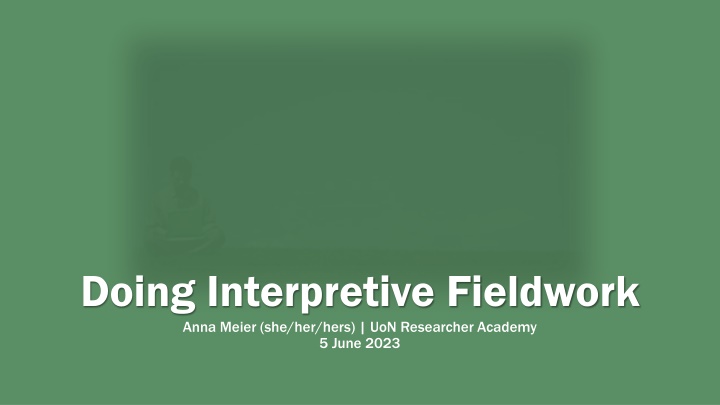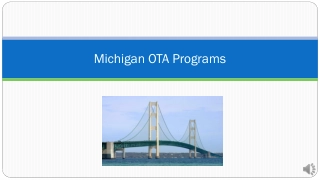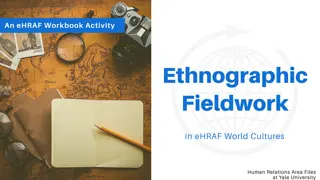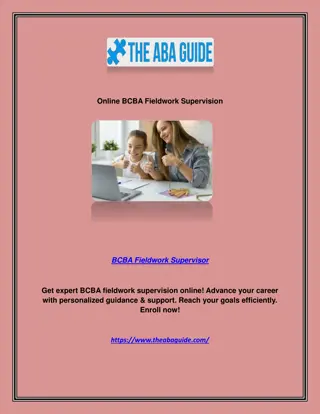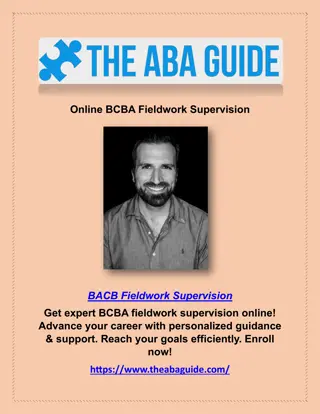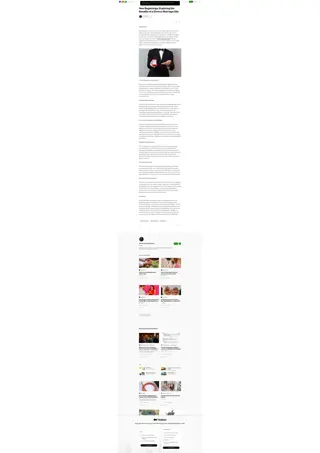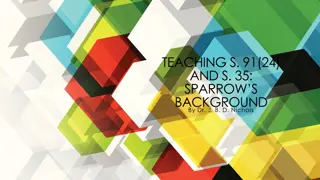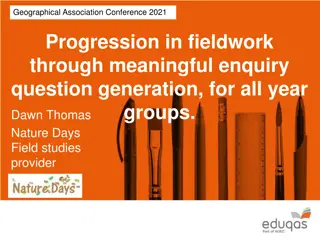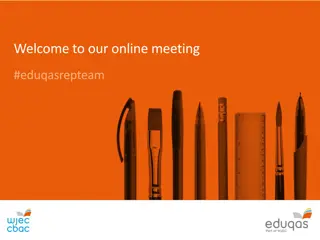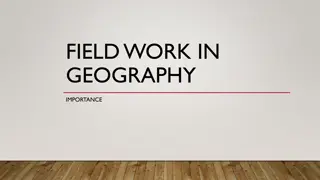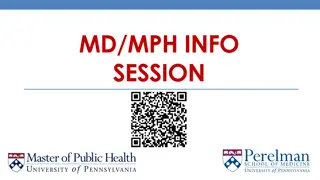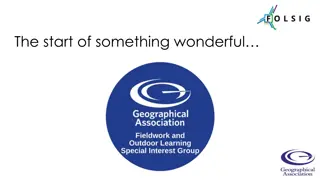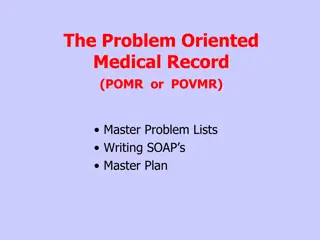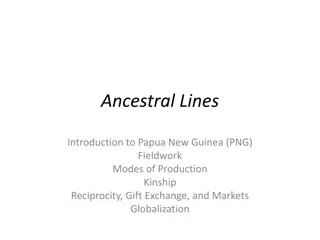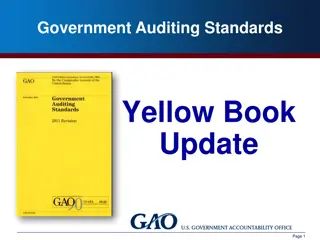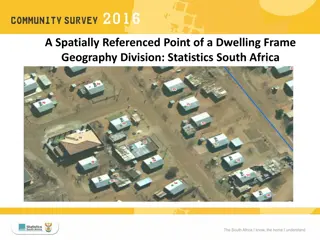Navigating Interpretive Fieldwork Challenges
Explore the nuances of interpretive fieldwork with an Assistant Professor sharing insights on epistemology, positionality, and navigating misconceptions. Discover the importance of training and ethical considerations in research practices.
Download Presentation

Please find below an Image/Link to download the presentation.
The content on the website is provided AS IS for your information and personal use only. It may not be sold, licensed, or shared on other websites without obtaining consent from the author.If you encounter any issues during the download, it is possible that the publisher has removed the file from their server.
You are allowed to download the files provided on this website for personal or commercial use, subject to the condition that they are used lawfully. All files are the property of their respective owners.
The content on the website is provided AS IS for your information and personal use only. It may not be sold, licensed, or shared on other websites without obtaining consent from the author.
E N D
Presentation Transcript
Doing Interpretive Fieldwork Anna Meier (she/her/hers) | UoN Researcher Academy 5 June 2023
Starting questions What discipline do you call home? What context do you research? This could be a country, city, community, organisation, group of people What are your preconceived notions about fieldwork? These may be shaped by your experiences with fieldwork or just things you assume (or have been taught to assume). Has anyone in your discipline disparaged you for doing (or wanting to do) fieldwork? Have you gotten sceptical reactions?
Why this session? Fieldwork is a part of many research projects, but training for it is scant. Even less training from a non-positivist standpoint This leads to a number of misconceptions Namely, that it s just talking to people or making it up as you go along. and bad situations for young researchers. tl;dr: making it up is hard at best and dangerous at worst We (as more senior researchers) can do better!
Who am I? Assistant Professor in the School of Politics Trained as a political scientist in the US Research: white supremacy and white supremacist violence Fieldwork: Germany and the US Interviews (bureaucrats, civil society) Archives Material and behavioural observation
Outline for today Interpretivism in a fieldwork context Interpretive epistemology; abductive reasoning; positionality and power Doing interpretive fieldwork Asking about meanings; positionality; learning and unlearning Publishing interpretive work Or, getting past reviewers Q&A Put clarification Qs in the chat whenever; save substantive Qs until the end
Not comprehensive (we have 90 minutes) Variation across disciplines and within them Variation across topics Caveats! My positionality isn t yours; my power dynamics are not yours Fieldwork should always raise questions of exploitation. Are we extracting knowledge, telling truths, or co-creating new meanings?
Interpretivism in a fieldwork context
What is interpretivism? An epistemology (way of knowing) focused on how people make sense of their worlds (meaning-making). Different from positivism: About uncovering lenses and frames of reference Rejects objective truth or a singular way of understanding something Examines constitutive rather than causal relationships Think messy rather than linear relationships The researcher as a crucial part of the data rather than an obstacle to be removed
Abductive reasoning Schwartz-Shea and Yanow (2012): starting with a puzzle or surprise and trying to explain it by identifying conditions that would make it less surprising Put differently: tacking between deductive and inductive reasoning How do you do this? Start wherever your understanding is at the moment (not necessarily the beginning ) Resist the rush to diagnose let your research iterate Review what you re learning and start again Disseminate your understanding (not necessarily the end )
In fieldwork Navigating what Michael Agar calls the emic (insider) and etic (outsider) Soaking and poking Can start from afar (with language, history, popular media ) Probably requires multiple trips (resource issues?) Your research question will iterate (and that s okay) May be less okay for funders
Positionality Your identities shape how you approach a context and how others react to you. Both consciously and unconsciously! You cannot remove or mitigate this (and that s not the goal!). Try thinking about it as important data. Reflexivity: considering how your positionality and that of your interlocutor(s) interact and affect your perceptions Let s do this now
Positionality and power Attention to positionality makes us question what is puzzling. James Baldwin: White people were, and are, astounded by the Holocaust in Germany. They did not know they could act that way. But I very much doubt whether Black people were astounded at least, in the same way. Leads us to different questions: Is my knowledge new, or new to me? Who is my audience? For what purpose am I translating for them? Am I extracting knowledge? Is that okay? Am I the right person to be doing this research?
In sum Interpretivism helps us understand how people experiencing or working on a topic that interests us make sense of or assign meaning to that topic. Figuring this out is not straightforward and can require long periods of exposure and immersion alongside deep case knowledge. We are part of our research design and data, which requires us to think reflexively. There is no right or complete answer in interpretive work, just inching along to a fuller understanding.
My fieldwork Where I started: how German and US counterterrorism policymakers understand their work Where I ve ended up: how German and US security institutions make sense of white supremacist violence What I do: talk to bureaucrats, legislative staffers, law enforcement officials, civil society actors, consultants, journalists, other researchers
Positionality My identities in Germany: My identities in the US: Most salient: race Most salient: race + job titles Important for access: Important for access: Language skills Job titles/class position Job titles/class position Generally: insider status Citizenship Important for shaping interactions: Important for shaping interactions: Gender Gender Political views Age Important for me: political views Political views Important for me: insider/outsider
Asking about meaning-making Use flexible lists of questions My style: let people talk (they ll let you know if they re uncomfortable) Use specific events as focal points What s in the news? What is salient for the other person? Pay attention to language Would you describe the same thing in the same way? What s being done? Pay attention to emotion Frustration, dismay, surprise these all tell you something
Asking about contentious topics Two approaches to start: Use credentials that matter to your interlocutor Feign (or enact!) ignorance Work up to what you care most about Start with the basics: What does a typical day look like for you? Be conscious of language EX: There is no word for white supremacy in German. Build on past interviews Someone else said X to me, and I didn t quite understand; can you help me?
How I learn After an interview: jotting impressions (metadata) Focus: noting surprise or confusion Next: fleshing out notes Also helps jog additional memories Later: looking up events/laws/publications Why did these come up? Why were they salient? Continuously: journaling Field notes, but more autoethnographic Review these frequently!
How I learn, contd Neighborhood walks Paying attention to place Email lists Radio and other local media Doing local things in local spaces Letting immersion be immersion
Positionality and power, redux Is my knowledge new, or new to me? A bit of both Who is my audience? For what purpose am I translating for them? Beyond my narrow research community People like me, in service of broader social goals Am I extracting knowledge? Is that okay? Maybe, but for me, the power dynamics of that are okay. Am I the right person to be doing this research? My own access and limitations
The challenge Interpretive fieldwork isn t positivist so mainstream journals (especially quant-oriented ones) may reject it. but it s also empirical so theory-oriented journals may reject it. There is also a lot of detail involved so word counts may be an issue. Books are nice, but they take a long time and you might need publications for a job.
Choosing a journal Go back to audience: who do you want reading your work? Don t discount journals that are general interest or on the outskirts of your field. Where do people you admire publish? What journals are a little more flexible with approach (i.e., have you ever been surprised to see X in Y journal)? Can you blaze a trail? Editorial teams matter! Talk to people: what were their experiences like?
Writing it up Don t try to do too much. Most papers, as initially conceived, are at least two papers. Think about what larger themes you can speak to. In my work: institutions; race & politics This may alter how you think about your work! Seek damning evidence. Quality, not quantity Be confident. Focus on what you did, not what you didn t do, and own it.
Reviewer 2 appears This isn t generalizable. In your head: That doesn t matter. Out loud: Frames from my case may shine new light on other cases, even if in different or unexpected ways. This is just your interpretation. In your head: So is all research. Out loud: Source triangulation (which requires deep case knowledge)
Reviewer 2 is still here for some reason You have like 10 observations. In your head: Do you have any idea how long my interview transcripts are. Out loud: My goal is not to be representative; it s to gain insight into how people important to [X] make sense of [X]. I think so-and-so is lying to you. In your head: If they are, that s interesting! Out loud: If so-and-so wanted me to believe [X], that narrative is part of my data. My goal is not truth but rather to share the narratives people tell.
At the end of the day What you are doing is valid. What you are doing is a real method. When you believe in your work, so will others. There are many who came before you; honor their work and let them help you (resources on the last slide).
Thank you! anna.meier@nottingham.ac.uk annameier.net @AnnaMeierPS
Recommended resources Timothy Pachirat (2018), Among Wolves: Ethnography and the Immersive Study of Power Erica Simmons and Nicholas Rush Smith (eds, 2021), Rethinking Comparison: Innovative Methods for Qualitative Political Inquiry Lee Ann Fujii (2018), Interviewing in Social Science: A Relational Approach Anna Meier (2020), On Writing The Idea of Terror Stories from the Field podcast Anna Tsing (2021), The Mushroom at the End of the World Katherine McKittrick (2021), Dear Science and Other Stories Denielle Elliott and Michael Wolf-Meyer (forthcoming), Naked Fieldnotes
